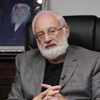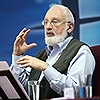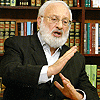Audio Version Of The Blog – 9/17/21
Listen to an Audio Version of the Blog
Download:MP3 Audio

Listen to an Audio Version of the Blog
Download:MP3 Audio
 Question: The foods we use at Rosh HaShanah for the festive table symbolize some kind of internal changes. Why is it necessary to eat them?
Question: The foods we use at Rosh HaShanah for the festive table symbolize some kind of internal changes. Why is it necessary to eat them?
Answer: The fact is that when we want to convey some laws, we put them in the form of folk customs and make them into something like sayings. In this way, they are preserved and passed on from generation to generation.
If you start saying: “The light of Hassadim, the light of Hochma, etc.,” then nothing will come of it. If people do not have adequate feelings, they will not preserve them. Therefore, everything is transmitted in this way.
In order to preserve the inner meaning of spiritual phenomena and actions, Kabbalists clothed them in some kind of material manifestations. At Rosh HaShanah we eat carrots, which symbolize kindness. We dip the apple in honey so that we have a good, sweet year. The pomegranate symbolizes 613 desires that we need to correct from reception to bestowal, from egoistic to altruistic.
That is, all these are particular signs in our world. This is how folk customs are passed from generation to generation although Kabbalists have put a much deeper meaning into them. We know and appreciate them because traditions are passed on in this way. But what matters most is what these customs indicate. They indicate their very high inner meaning. This is what we must perform.
Question: That is, a Kabbalist feels the desire to receive with the intention for his own sake. In this world to somehow convey the signs of correction to everyone else, he takes an apple, which symbolizes the desire to receive, dips it in honey, as if sweetening it with the right intention, and thus the semantics are obtained?
Answer: These are just external signs, nothing more. We should understand that at the same time a Kabbalist wishes that the fruit of that tree, which deliberately threw out the person from the spiritual level, now with the help of Amtakat Hadinim (sweetening the judgment), that is, sweetening with honey, would correct the evil inclination of a person and he would rise to the level of his correction.
[287095]
From KabTV’s “Spiritual States”
Related Material:
Two Spiritual Actions
It’s Time For Spiritual Action!
Spiritual Roots Of The Traditions Of This World
 Today we celebrate the memorial day of my teacher Rav Baruch Ashlag (Rabash). There were thousands of Kabbalists who lived before him and millions of people who dreamed of revealing spirituality.
Today we celebrate the memorial day of my teacher Rav Baruch Ashlag (Rabash). There were thousands of Kabbalists who lived before him and millions of people who dreamed of revealing spirituality.
But now all this work is focused on us and we must try to bring ourselves to the form of the so-called last generation so that we reach the spiritual level through faith above reason, the first association with the spiritual world with its forces and possibilities.
All of humanity is beginning to feel its dependence on each other both in a bad and in a good sense, both its dependence on terrorist groups hungry for war and on people who strive to unite.
We are all part of humanity and we are increasingly aware of our connection with each other. So far, this dependence is expressed in unpleasant forms, the pandemic, for example. But on the other hand, we are advancing more and more because we see that our connection comes from above as a necessary condition for moving forward.
Two great Kabbalists: Baal HaSulam and his eldest son, Rabash, created a methodology designed for the last generation, for us. Therefore, we are extremely grateful to these two Kabbalists and to the Creator who sent them to us. Rabash writes that if a group of people united by a common goal gathers together ready to annul personal interests for the sake of connection, then such a group is able to achieve the sublime goal even here in this world.
The more a person values the group, the teacher, and the Creator, the more he approaches the force of bestowal and reaches faith above reason. There is one main principle that operates here called “The Torah, the Creator, and Israel are one.”A person seeks to join the ten, which he organizes so that it becomes a place for the revelation of the Creator in it.
We must act in this world as messengers of the Creator, fulfilling the desire from above and helping it to be realized in humanity. After all, there is no such connection between the Creator and humanity that would allow people to feel the Creator’s intention. Therefore, we need to implement this connection, to rise to the spiritual level of faith above reason, and at the same time be within reason, that is, to serve as a transition between the Creator, the force of Bina and Malchut for the whole of humanity.
In this way, we will be able to shift all our forces and intentions to humanity, which will join us and rise with us together as a supporting force, the AHAP of the spiritual degree.
Of course, there is nothing new under the moon, and the concept of faith above reason was known to Kabbalists even before Rabash. But it was not clarified and explained in such detail as Baal HaSulam and Rabash did in order to bring this technique to practical implementation among the masses.
Rabash explained the method of Baal HaSulam in detail and expanded it in his articles. In fact, he took the entire spiritual path that a person should go through and thoroughly explained it. All his articles are like one fascinating novel explaining the spiritual development of a person and his ascent from the animate to human level.
We do not even understand what infinite depth Rabash’s articles hide. Only when we climb the spiritual ladder to the final correction will we be able to assess how this man has prepared the whole path for us and what supreme degrees he describes in his articles.
[287267]
From the 2nd part of the Daily Kabbalah Lesson 9/12/21,”Day of Remembrance of Rabash”
Related Material:
Who Is Rabash?
Closing The Chain Of Great Souls
In Memory Of Rabash
 Question: Ten days after the New Year, called the days of atonement, Yom Kippur begins, the day of correction. What corrections are taking place during these days from the point of view of the spiritual work of a person who is already advancing?
Question: Ten days after the New Year, called the days of atonement, Yom Kippur begins, the day of correction. What corrections are taking place during these days from the point of view of the spiritual work of a person who is already advancing?
Answer: A person who is advancing, checks himself during these ten days. He must clearly determine in what he is different from the Creator. This demonstrates his concern to observe the spiritual laws of equivalence with the Creator.
Ten days symbolize ten Sefirot, ten qualities. In each quality, he checks how different he is from the Creator.
Question: Can he check particularly this?
Answer: A person who exists in the spiritual world is obliged to do this. So he does. On the corporeal level, however, this remains as a habitual custom and a person who is not engaged in spiritual work simply asks to have a good year.
[287120]
From KabTV’s “Spiritual States”
Related Material:
A Special Silence During The Day of Atonement
How One Develops The Sixth Sense
A Taste That Cannot Be Compared To Anything In This World
 All holidays symbolize special states in the spiritual elevation of a person. If we work as we should, then from year to year, day by day, we climb the spiritual ladder more and more until we reach complete adhesion with the Creator.
All holidays symbolize special states in the spiritual elevation of a person. If we work as we should, then from year to year, day by day, we climb the spiritual ladder more and more until we reach complete adhesion with the Creator.
The ascent above egoism is called Passover, the exit from Egypt, and the acquiring of the force of bestowal is called the holiday of Shavuot.
Then a person judges himself and sees that he is not capable of giving, which is called the 9th of Av. And then he decides to start his whole life anew with a new relation to the Creator, which is called the New Year, Rosh HaShanah.
And the most important thing is to make a correct calculation of how to enter this new period, this new time. Many times in his life, a person wanted to change his life and, as though, start it all over again. This is a sign of the Day of Judgment, Yom Kippur, one of the days that a person must pass through to achieve equivalence with the Creator.
Yom Kippur comes from the word “atonement” (Kapara); it is when a person asks for forgiveness from the Creator. After all, he tested himself and saw that many times he had the opportunity to correct himself and achieve adhesion with the Creator, but he neglected this and could not overcome his egoism.
A month before Yom Kippur, a person begins to check himself and sees that he is in egoistic desires to get pleasure for himself and does not want to use them to correct himself and get closer to the Creator. And for this he asks for forgiveness, one realizes that at that time he did not have any strength and opportunity to overcome his pride and ask for help. After all, our entire correction consists in asking the Creator for the power of correction.
It turns out that our whole crime is that we did not ask for help, and we should ask for forgiveness for this. “I am sorry I did not ask,” which means, to ask the Creator to forgive us for not turning to Him with a request to correct us.
The Creator created egoism, but man must realize that egoism is the only evil that exists in him. Through the prism of this evil, we look at the whole world and therefore the whole world seems bad to us. And in accordance with this we relate to the Creator because this whole spoiled picture of the world allegedly comes from Him. It turns out that we blame the Creator for making us and this world so bad.
And at this moment, a person does not realize that the Creator gave him egoism and the ability to look through it at the whole world in order to ask the Creator to correct this egoism and replace the evil nature with a good one.
This is the person’s work. The only thing we need to do is to know the evil contained in us and realize that the Creator gave it intentionally so that we would turn to Him and ask Him to replace egoism and the inability to do good deeds, to correct all the evil to good.
After all, there are no good forces in us and there will not be if we do not ask for them from the Creator, and then we will be able to feel and see the whole world through a good desire. Then the world will seem like a real paradise to us.
Therefore, all our work is to reveal our evil, the reason why we see evil around and inside ourselves, and then turn to the Creator to turn this evil into good. This work is done by the Creator and therefore it is called the work of the Creator (Avodat Hashem). And the request for the Creator to do this is called the day of repentance, Yom Kippur.
It turns out that this is not a day of mourning, but a day of joy because we judge ourselves and see that in order to correct our condition, we only need to ask the Creator to turn the evil desire with which He created us into a good desire.
So, we have someone to turn to and what to ask for. And everything depends only on our request. And the whole past, when we were weak and unable to do good deeds, were confused and insignificant slaves of our nature that dominates us in everything, all was deliberately created by the Creator to show us our powerlessness and awaken in us the desire to free ourselves from our egoism and turn it into bestowal.
This is the main meaning of the Day of Judgment, Yom Kippur, when we ask the Creator to take away our evil, egoistic desire and turn it into a good, altruistic desire, into love. And then we will climb up from a deep hole to a high mountain.
Therefore Yom Kippur is the most significant day of the year when we spend all 24 hours thinking about how to ask for forgiveness for our weaknesses, all the evil that we have created in our egoism that was given by the Creator. And since we decide that this evil was created in us by the Creator, we have the opportunity to turn to Him and ask for the power of good instead of this evil. As a result of this request, we will gain more and more forces of good and will rise higher and higher until the very end of correction.
It turns out that each of us and all of us together should do this work not only once a year, on Yom Kippur, according to the calendar, but every day and as much as possible we should turn to the Creator and ask Him to turn our evil inclination into a good inclination. To the extent of our ability to turn to the Creator and demand this correction, we will be able to become like Him and achieve adhesion with Him and perfection, i.e., the end of correction.
This is what you need to think about and try to implement in the next twenty-four hours.
[287386]
From the 2nd part of the Daily Kabbalah Lesson 9/15/21, “Yom Kippur – The Day of Atonement”
Related Material:
Yom Kippur: Universal Joy Or Grief?
Yom Kippur
The Day Of Atonement
My new article on Linkedin “80 Years after the Babi Yar Massacre – Our Duty Cannot Be Destroyed”
In September 1941, within just two days, the Nazis murdered 33,771 Jews in the Babi Yar ravine on the outskirts of Kiev in then Nazi-occupied Ukraine. In doing so, they had effectively eliminated the Jewish population in the country’s capital. The Jews did not gather in the ravine of their own volition. On September 19, the Nazis conquered the city and immediately started gathering all the Jews, with the locals eagerly assisting them. Once at the ravine, they were stripped of their clothes, jewels, and documents, then shot and dumped into the valley of death. Heaps of men, women, and children were buried there, and their story was silenced for many years.
The Nazis were the killers, but the thing that astounded many people most was the enthusiasm with which the Ukrainians helped them. Even the Nazis were bewildered by the ruthless hatred of the locals, as I had personally heard from people who lived at the time when the event took place.
Nevertheless, I truly have no grievances, no bitterness or anger toward any nation, however antisemitic. Since I understand where the hatred comes from, I can only point the finger at its source and urge its correction: we ourselves, the Jews.
Since the inception of our nation, we have been an oddity among the peoples. Our ancestors were not blood related or emerged from a single tribe, as is usually the case with the birth of nations. Rather, they were outcasts, pariahs, rebels who did not get along with their own people because they asked too many questions or were too opinionated. In the end, they found a like-minded leader who united them all under a unique ideology, which King Solomon later captured with a single verse: “Hate stirs strife, and love will cover all crimes” (Prov. 10:12).
That leader was Abraham, and the ideology he had developed grew into what became a binding law of love of others. The specifics of that law were described in the Torah, and based on the law of love of others, a new nation was born: the “People of Israel.”
The birth of the Israeli nation was no fluke. It came into the world in order to prove that people can unite above all differences, that there can be peace on Earth, and that by rising above our differences and hatred, we develop a new quality: the quality of love of others, to the point that one loves one’s neighbor as oneself.
Another uniqueness that Israel possessed was the fact that in order to become a Jew, you needed only to adhere to the law of loving others. It was an internal bond with others that made you Israel, and adhering to it was Israel’s source of strength. When Israel maintained it, it was untouchable; when it abandoned it, it grew weak and vulnerable, and other nations would conquer and afflict it. But the people of Israel were never entirely eliminated, not even during World War II, since its duty cannot be destroyed.
Once the people of Israel became a nation, they were tasked with setting an example of unity above division. The Torah phrases it with the simple onus to be “a light unto nations” (Isaiah 49:6), a light that illuminates the path out of the ego that is ravaging humanity and destroying the planet.
But we failed the nations and fell into unfounded, deep, and constant hatred of each other, and the world will not forgive us. This is why there is not one nation that is not antisemitic to various extents.
However, not all is lost. On the contrary: As soon as we reestablish our unity, the world will change how it feels about us. You can destroy the Jews, but you cannot destroy the mission of the Jews. Therefore, until we carry out our duty, become the light of the nations by uniting above internal hatred, the world will not accept us or regard our existence in the land of Israel or anywhere else as legitimate. But once we rise above division, we will indeed be “a light unto nations.”
For more information on the topic, refer to my books The Jewish Choice: Unity or Anti-Semitism, historical facts on anti-Semitism as a reflection of Jewish social discord, and Like a Bundle of Reeds: Why unity and mutual guarantee are today’s call of the hour.
[287693]
My new article on Linkedin “The Twenty Dark Years of the Durban Conference”
Durban is a global port city in South Africa, a city steeped in influences from many countries and immersed in a mixture of different cultures. It is a city of contrasts: modern skyscrapers alongside urban areas surrounded by markets, a promenade adorned with palm trees alongside dark roads.
Despite all the abundance and multicultural atmosphere this city has to offer, the name “Durban” carries with it a bitter connotation for Jews. Particularly, the words “Durban Conference.” Twenty years ago, in September 2001, the first Durban Conference, which was supposed to be an event to combat racism, discrimination and xenophobia, rapidly became a potent fertilizer in the ground of hatred against Jews and Israel in particular.
It is clear that the seeds of antisemitism did not start then, but the forum certainly accelerated and expanded the venomous accusations against Israel as an “apartheid state,” it propeled the deligimitazation of the state of Israel and its subsequent boycott through global movements such as the BDS (Boycott, Divest and Sanctions.)
This is where the new antisemitism began and the hostile treatment of Jews and Israel erupted in full force, again. Zionism also became synonymous with racism, and the Holocaust was portrayed not as an atrocity aimed at destroying European Jewry, but the justification for “Israel’s wrongdoings.”
On September 22, 2021, an event marking the twentieth anniversary of the Durban Conference will be held in New York as part of the annual UN General Assembly, but unfortunately, nothing has changed for the better in the last twenty years. They are the same wolves in sheep’s clothing.
This year, too, when at least 16 countries show support for Israel and are boycotting the event because of its antisemitic stench even more so than in previous conferences—it is not a real sign of progress. I do not believe for a moment that these countries tend to favor the State of Israel or are sympathetic to Jews wherever they are.
You can buy some fake smiles with money, but the world will not turn over and change as a result of it. It is impossible to solve the phenomenon of age-old antisemitism at conferences. It is possible to gather from conference to conference, but other than money and publicity to promote political agendas or to mark that we have done something about it, no real benefit will come out from such events.
The only condition for change is the self-awareness of the people of Israel and a new attitude about our destiny. The Jewish people were founded from a collection of representatives from different peoples, a composition of different elements, equally committed to unity and love of others.
Antisemitism is resentment of us by the nations of the world. They feel Jews hold the secret for a better future but that we are not opening the pipe for that goodness to flow to all the peoples. Subconsciously, the world expects us Jews to connect with each other, to be united and reach a strong feeling of love for others. If we act in this way, we will be a light unto the nations, we will spread light and not darkness, love instead of hatred. Only in this way will we eradicate the hostilities against us.
Our mission is to bring the method of connection to foster unity and mutual consideration. If we dedicate ourselves to this task and connect together over the differences between us, over the elements that separate us, over the ethnicity and partisanship that tear us apart from within, then we will be an exemplary nation for all peoples.
Even the first tiny step towards unity between us will awaken a stronger connecting force, a supreme force that is essential for all of us. Then, the direction will change from bad to good. As it is written, “We are commanded at each generation to strengthen the unity among us so our enemies do not rule over us.” Rabbi Eliyahu Ki Tov, The Book of Consciousness
[287481]
 It is not always possible for a person to overcome his egoistic desire and rise above it. This means that his inclination for bestowal is still very weak compared to his great will to receive. Therefore, he feels disappointed that he cannot receive the results of his work inside egoism.
It is not always possible for a person to overcome his egoistic desire and rise above it. This means that his inclination for bestowal is still very weak compared to his great will to receive. Therefore, he feels disappointed that he cannot receive the results of his work inside egoism.
According to the program of creation, his soul should have already progressed to the desire of bestowal and instead of being aimed at himself to be aimed at the Creator. Therefore, he is shown that he made a mistake in some part of the spiritual process. He needs to check where this mistake was in order to succeed next time. This next time may be in a few seconds or minutes.
If I do not see success on my spiritual path, then I am not ready for it yet, and I thank the Creator for showing me that I am not yet able to progress directly but only from mistake to mistake. This is how we learned at school: first we wrote, and then we worked on the mistakes made, and gradually we progressed.
The same is true in spiritual advancement, until the very end of correction, we always reveal our mistakes and advance on them. Our entire advancement is based on the fact that we reveal mistakes and learn from them.
It is written: “A thousand times the righteous will fall and rise again.” Only as a result of falling, we reveal our mistake, correct it, and rise to the next state. In the next state, we try to do something, make a mistake, fall, reveal the fall, the mistake, the reason for the failure, and correct our attitude and rise.
This is how it happens every time, therefore it is written: “A thousand times the righteous will fall and rise again.” Do not think that you will ascend the high degrees of the spiritual ladder like you are on an escalator. There will always first be a fall in order for you to understand why you fell and to correct yourself.
Precisely by correcting the falls we are scrutinizing the Reshimot. As in the world of Adam Kadmon when AB and SAG are born from Galgalta.
Why does the Partzuf develop? It is because it feels its weakness and inability to receive light. Therefore, it is impossible to advance without falling. It is the fall that reveals a deeper will to receive hidden in a person, more subtle and deeper qualities, and helps to advance.
This is the same in any profession: first, we reveal the problems and from them we come to the breakage and the correction. There is no choice, the created beings can attain the perfect only from the imperfect. The further we advance, the more imperfections we see in the Creator and at the same time we discover that this is exactly what perfection is if we look at it with corrected eyes.
[287303]
From the Daily Kabbalah Lesson 9/11/21, “Faith Above Reason”
Related Material:
Fall, But Do Not Lose Your Aspiration Forward
Should One Be Afraid Of Mistakes On The Spiritual Path?
It Is Pointless To Regret What Was Swallowed In Ein Sof
 Michael Laitman, On Quora: “What is the simplest life advice you can give me?“
Michael Laitman, On Quora: “What is the simplest life advice you can give me?“
The very first and simplest advice are the well-known rules: “That which you hate, do not do to your friend” and “Love your neighbor as yourself.”
Written/edited by students of Kabbalist Dr. Michael Laitman.
 Question: What does “Yom Kippur” mean?
Question: What does “Yom Kippur” mean?
Answer: Yom Kippur is Ki Purim, like the day of Purim. “Kippur” means “atonement,” “Purim” comes from the word “Pur,” which means fate.
Therefore, Yom Kippur reveals all our sins that we must gradually correct. From Yom Kippur to Hanukkah, we correct our bestowing desires in order to be only in bestowal, and from Hanukkah to Purim, we also correct the qualities of reception so that they are aimed toward bestowal. Thus, we come to the holiday of Purim.
There are certain prohibitions on Yom Kippur: people do not drink, do not wear leather clothes, and so on. This means that we find egoistic inclusions in all of our desires, and therefore, we cannot use them.
The five types of prohibitions correspond to the five types of restrictions because our egoistic desire consists of five degrees. Each degree corresponds to food, drink, clothing, and so on.
Question: Why is it forbidden to wear leather clothes on this day?
Answer: Clothes (Levush) means that you have a Kli (vessel), a certain correction, and then you can wear such clothes. However, you discover that all of your desires are egoistic, and therefore, you cannot wear them. There is a prohibition on using uncorrected desires.
In his spiritual advancement, a Kabbalist fulfills these prohibitions, meaning restrictions on his desires, checks himself and acts in this way.
Question: Do we also need to observe this in our world?
Answer: Of course, in our world, this exists as a custom. Otherwise, they would not have been passed down from generation to generation for the people and would exist only among Kabbalists who understand their essence and act in this way. Moreover, Kabbalists do this not on the calendar date of Yom Kippur, but every time they are in such a state.
Question: What does a Kabbalist ask for on this day?
Answer: He asks the Creator to help him to exit the boundaries of his egoism. He has no other requests.
There can be only two types of addresses to the Creator: the first is with gratitude for having received such a special work and the second is with a request for strength to rise even higher to the quality of bestowal.
[287340]
From KabTV’s “Spiritual States”
Related Material:
From Yom Kippur To Purim
The Way To A State Of Yom Kippur
Yom Kippur: Sorrow Or Joy?